GALLUP NEWS SERVICE
PRINCETON, NJ -- Over the past several months, Americans have indicated their fundamental support for the United Nations as an international arbiter, while at the same time expressing doubts about its ability to deal with Saddam Hussein and the Iraqi situation. Most Americans want the United Nations to pass a resolution of support before the United States makes any attack on Iraq, but beyond that they are skeptical that the United Nations can deal effectively with the current Iraqi situation. Moreover, most Americans feel the United Nations has not been tough enough in its treatment of Saddam Hussein. While most Americans do not favor an immediate invasion of Iraq and are willing to give diplomacy more time to be effective, just over half say that military action should be taken by the end of the year if diplomatic efforts do not work.
A Sept. 2-4 CNN/USA Today/Gallup Poll showed that, while a majority of Americans supported an invasion of Iraq to remove Saddam from power, an even larger majority, greater than two-to-one, said the Bush administration should get a resolution of support from the United Nations before the United States attacks Iraq. And a Sept. 20-22 CNN/USA Today/Gallup Poll showed that, absent U.N. support, just over a third of Americans would support an invasion. But if the United Nations grants its support, about eight in 10 Americans would favor such military action.
| Support Invasion of Iraq in Following Situation? |
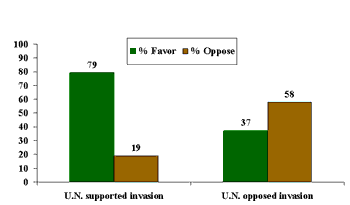 |
Americans' support for the United Nations as an international arbiter can also be found in the Palestinian-Israeli conflict. In general, Americans express sympathies for the Israelis over the Palestinians by a three-to-one margin. But last April, when Israel barred U.N. investigators from a Palestinian refugee camp, Americans sided with the United Nations over Israel by more than a three-to-one margin.
Despite these examples of public support, Americans are divided over whether the United Nations can deal with the Iraqi situation effectively. In mid-September, a CNN/USA Today/Gallup Poll found that eight in 10 Americans felt the United Nations had not been tough enough in dealing with Iraq.
| Do you think the United Nations -- has been too tough, has been about right, or has not been tough enough -- in dealing with Iraq? |
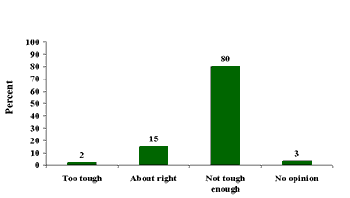 |
| Sep 13-16, 2002 |
That poll also showed that 93% of Americans favored a U.N. deadline for Iraq, which would lead to "grave consequences" should Iraq fail to submit to weapons inspections as specified in the resolution. For most Americans, those "grave consequences" would be U.N. authorized military action against Iraq, a step supported by 61% of the public. Just 35% opted for continued diplomatic efforts if Iraq did not submit to the U.N. inspections.
Despite their call for the United Nations to adopt a stronger get-tough policy with Iraq, Americans are divided over how well the United Nations can deal with the Iraqi situation in general. Americans are also highly skeptical that the United Nations can eliminate the threat that Iraq might use weapons of mass destruction against the United States.
An Oct. 21-22 CNN/USA Today/Gallup Poll shows that 52% of Americans express a "great deal" or "moderate amount" of confidence in the United Nation's ability to handle the current situation in Iraq, while 47% say they have not much or no confidence at all.
| How much confidence do you have in the United Nations' ability to handle the current situation in Iraq -- a great deal, a moderate amount, not much, or none at all? |
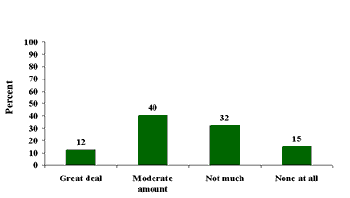 |
| Oct 21-22, 2002 |
A more general question asking Americans to assess the performance of the United Nations finds 43% saying the organization is doing a good job, and 51% a bad job. Over time, good ratings of the United Nations have varied from a low of 28% in 1985, to a high of 58%, measured last February.
| Do you think the United Nations is doing a good job or a poor job in trying to solve the problems it has had to face? |
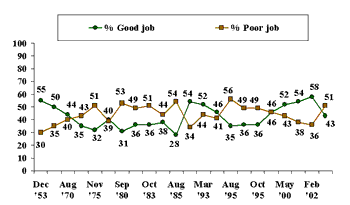 |
While both of these questions show the public to be about evenly divided over the U.N.'s current performance and ability to deal with the Iraqi situation in general, the majority of Americans clearly feel that there is little hope that U.N. inspections can be effective. The Sept. 20-22 poll shows that 68% of Americans believe that such inspections would not eliminate the threat that Iraq might use weapons of mass destruction against the United States, while just 27% disagree.
| If the United Nations does conduct inspections, do you think these would -- or would not -- be effective in eliminating the threat of Iraq using weapons of mass destruction against the United States? |
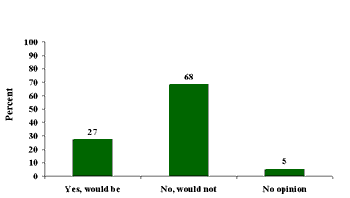 |
| Sep 20-22, 2002 |
Most Americans Willing to Give Diplomacy Time to Work -- But Not For Long
The Oct. 21-22 poll shows that Americans favor an invasion of Iraq by a margin of 54% to 40%. This level of support is based on responses to a general question asking about support or opposition to "invading Iraq with U.S. ground troops in an attempt to remove Saddam Hussein from power," and is roughly in line with the level of support expressed by Americans over the last two and a half months. Support for an invasion surged after 9/11, with 74% in November 2001 saying they favored an invasion. But in the past year, support has declined to the current levels.
| Would you favor or oppose invading Iraq with U.S. ground troops in an attempt to remove Saddam Hussein from power? |
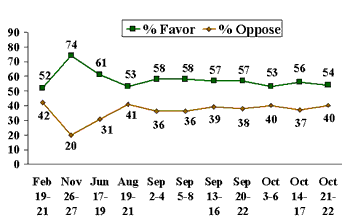 |
The importance of 9/11, at least in the minds of the public, can be seen in the response to a question that asked whether Americans would have supported an invasion had the terrorist attacks not occurred. The results suggest that there would be net opposition -- 50% say they would have opposed an invasion and 44% say they would have supported one if the attacks had not occurred.
| Suppose the World Trade Center and the Pentagon had not been attacked, would you have supported invading Iraq with U.S. ground troops in an attempt to remove Saddam Hussein from power, or not? |
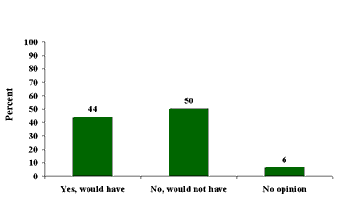 |
| Oct 21-22, 2002 |
These responses no doubt reflect what Americans think today, but it is useful to note that a poll in February 2001, many months before the 9/11 attacks, found a slight majority in favor of an invasion, by 52% to 42%.
The current poll measured the public's sense of timing about an Iraqi invasion. The results show that only 25% of Americans want to invade Iraq immediately, while 60% are willing to give diplomatic efforts more time to work, and 12% say the United States should never invade Iraq.
| Which comes closer to your view -- the United States should invade Iraq with ground troops immediately, the United States should give diplomatic efforts more time to be effective before invading Iraq with ground troops, or the United States should never invade Iraq with ground troops? |
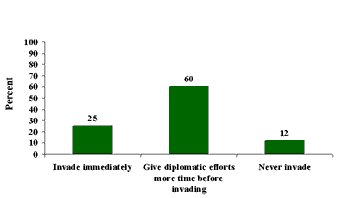 |
| Oct 21-22, 2002 |
However, close to half (47%) of those willing to give diplomacy more time (or 28% of all Americans) are willing to wait only until the end of this year. Another 36% of those who want to wait (22% of all Americans) say they would be willing to do so until the end of next year. Thus, overall, about half of all Americans (53%) favor an invasion within the next couple of months (25% immediately, 28% by the end of the year). And by the end of next year, if the situation remains the same, about three in four Americans would support an invasion.
How long should the United States wait for diplomatic efforts to be effective before it invades Iraq with ground troops -- until the end of this year, until the end of next year, within another two to three years, or longer than that?
BASED ON --632-- ADULTS WHO SAY GIVE DIPLOMATIC EFFORTS MORE TIME BEFORE INVADING IRAQ WITH GROUND TROOPS
|
|
|
Another two-three years |
Longer |
|
|
|
2002 Oct 21-22 |
47% |
36 |
5 |
4 |
8 |
COMBINED RESPONSES
|
2002 Oct 21-22 |
||
|
% |
||
|
United States should invade Iraq with ground troops immediately |
25 |
|
|
United States should give diplomatic efforts more time to be effective before invading Iraq with ground troops |
|
|
|
(Should wait until the end of this year) |
(28) |
|
|
(Should wait until the end of next year) |
(22) |
|
|
(Should wait another two-three years) |
(3) |
|
|
(Should wait longer than three years) |
(2) |
|
|
(Unsure of time to wait) |
(5) |
|
|
United States should never invade Iraq with ground troops |
12 |
|
|
No opinion |
3 |
|
Survey Methods
The latest results are based on telephone interviews with 1,018 national adults, aged 18+, conducted Oct. 21-22, 2002. For results based on the total sample of national adults for each survey, one can say with 95% confidence that the margin of sampling error is +/- 3 percentage points. In addition to sampling error, question wording and practical difficulties in conducting surveys can introduce error or bias into the findings of public opinion polls.
